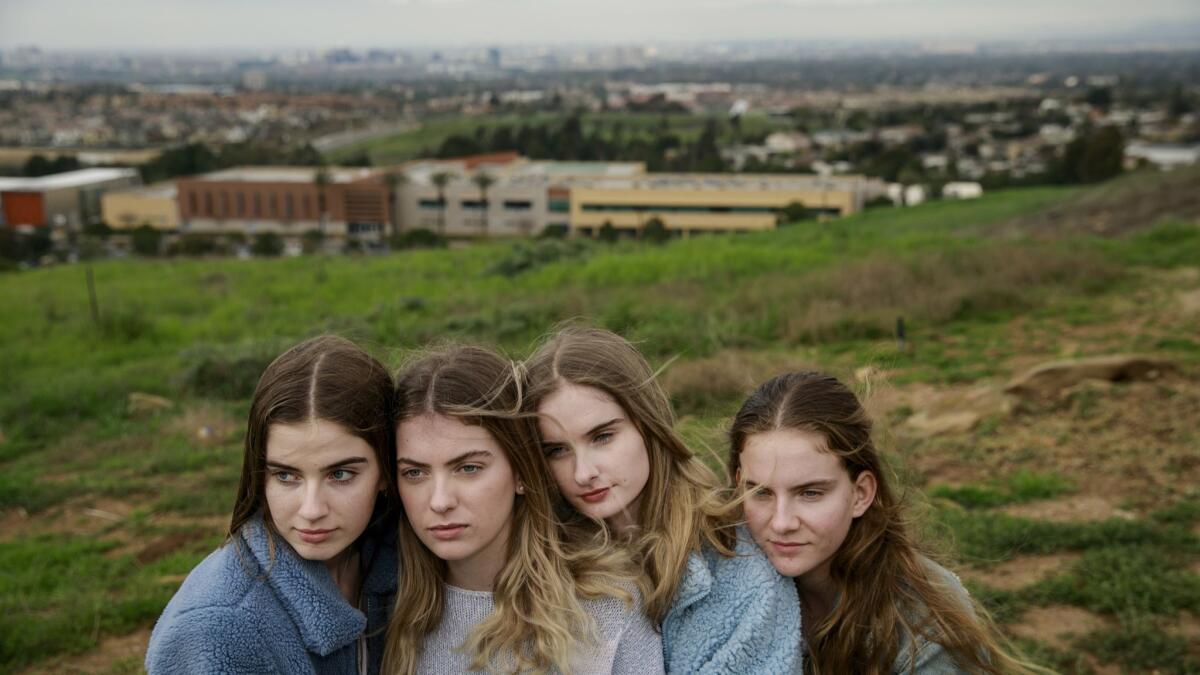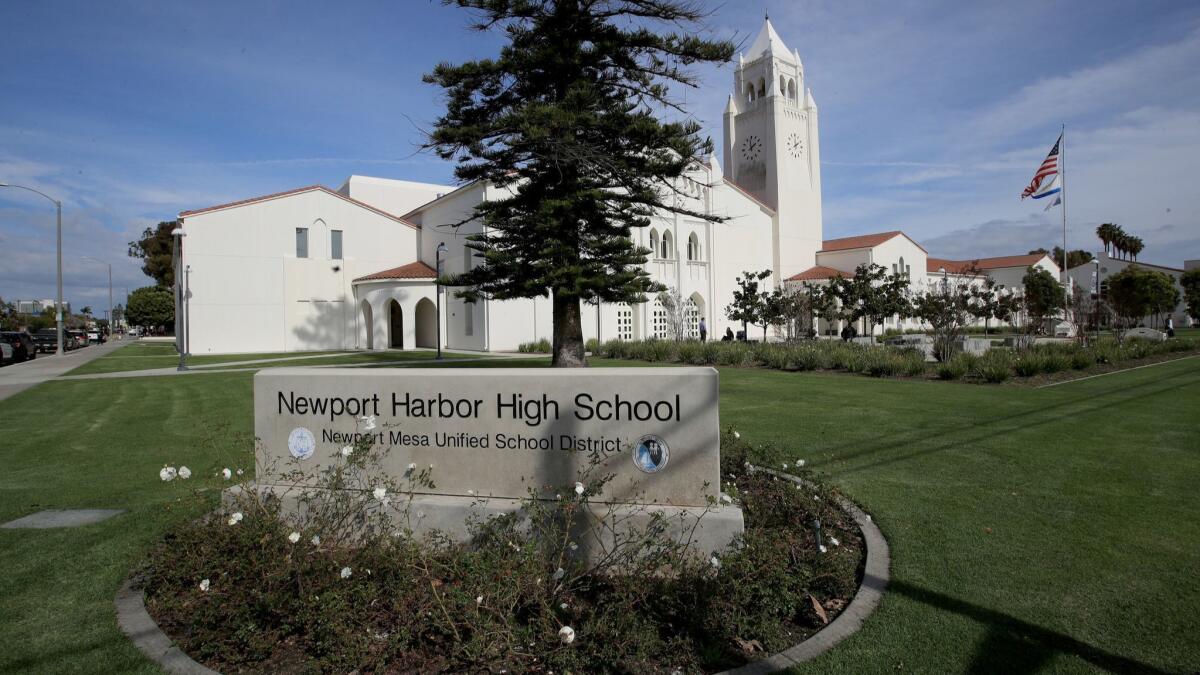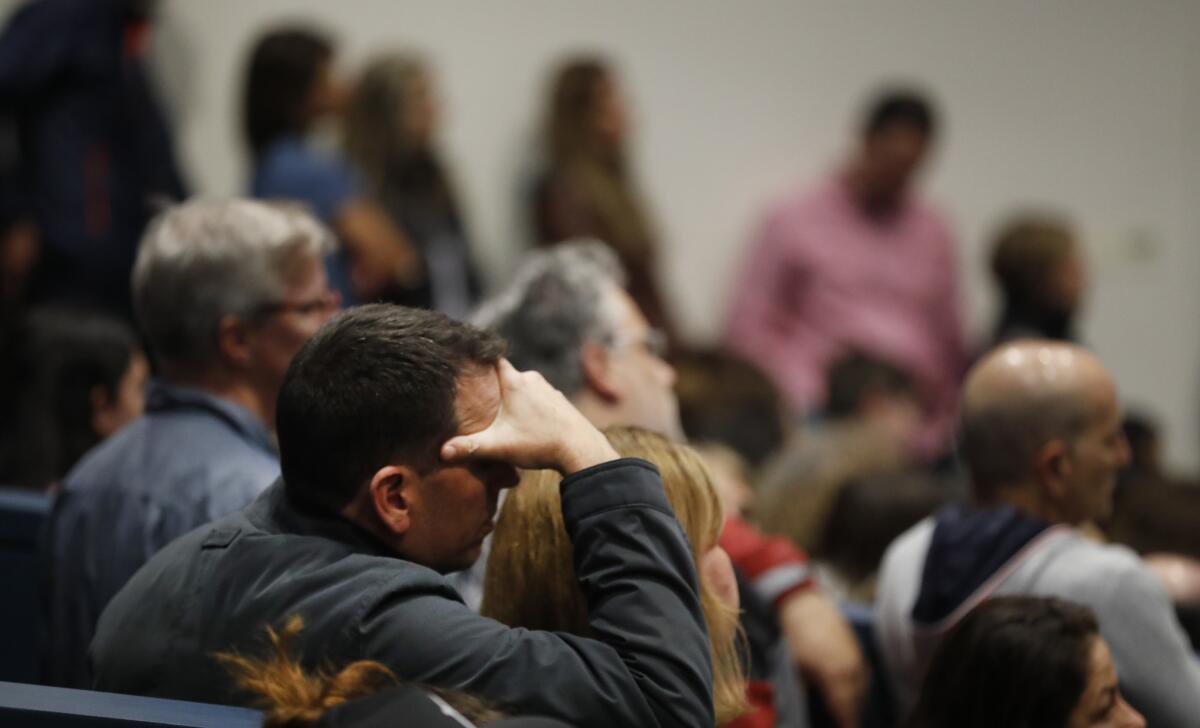Must Reads: As Nazi horrors fade into history, some youths are seduced by hate, others will never forget

When Kaitlyn saw the Snapchat photos of fellow Orange County teenagers posing around a swastika made of red Solo cups, she immediately posted a screenshot to social media, expecting outrage.
Instead, she got a mixed response. Some people were offended by the display. But others said they were more surprised by the outcry — arguing that students, some posed with their arms raised in Nazi salutes, were just joking.
“How can these kids who have been educated about [the Holocaust] still find it funny?” said Kaitlyn, a 17-year-old student at a private Jewish school in Irvine.
The Holocaust is a standard topic covered in history classes, and “The Diary of Anne Frank” is often required high school reading. But with time, knowledge of the Nazi atrocities among young people has decreased. And some darker ideas are filling the void.
A study commissioned last year by the Conference on Jewish Material Claims Against Germany showed that 66% of U.S. millennials did not know what the Auschwitz concentration camp was. Four in 10 millennials thought 2 million or fewer Jewish people were killed during the Holocaust; the actual number is around 6 million.
For people born after 2000, post-millennials, the Holocaust feels less real, as they’re less likely to hear from the ever-dwindling number of survivors and WWII veterans, said Edward Dunbar, a UCLA clinical professor who has researched hate crimes and violence for two decades.
“These forms of atrocities are fading far into the distance for young non-adults, adolescents and teenagers, and it’s no closer than the Civil War would be for them,” Dunbar said.
Brian Levin, director of Cal State San Bernardino’s Center on Hate and Extremism, said revisionist history about issues like the Holocaust can eventually lead to hate crimes.
What’s most disturbing about incidents like the Costa Mesa party last weekend, he said, is that most of the students likely are not “hardened bigots” but that Nazi symbols have become so mainstreamed that their meaning has been diluted.
“What’s scary is that there’s far more ignorance in America than evil, but ignorance is the soil from which evil takes root,” Levin said. “When we get to a point where it’s elected officials appearing in blackface in their younger days and younger people today making light of the Holocaust, it shows an incredible stressor on the civic fault lines.”
The Orange County incident comes as hate crimes are spiking nationwide. From 2014 to 2017, anti-Semitic hate crimes rose 54%, according to the FBI.
Particularly alarming, experts on hate and extremism said, is the rise in incidents on school campuses. In California, there was a 65% increase in hate crimes on elementary and secondary school campuses from 2012 to 2017, according to a report by the state’s Department of Justice.
There has been a huge jump in recent years of reported “papering” incidents on high school and college campuses, with hate groups posting fliers with slogans like, “It’s OK to be white” and “protect your heritage,” Levin said.

The Orange County teenagers, who were attending a Costa Mesa house party, were far from the only ones to have invoked Nazi iconography or gestures.
In December, students at Matilija Junior High School in Ojai lay down on a field in the shape of a swastika and shared a photo in a group chat that included racist comments. In 2016, a sophomore at Shadow Hills High School came to class dressed as a Nazi on Halloween, and the school held sensitivity training after pictures of her circulated on Twitter and Snapchat.
High school students in New Jersey, Florida, Kansas and Georgia have been punished in recent years after posting photos of a beer pong-style drinking game called “Jews versus Nazis,” in which teams arrange plastic cups in the shape of swastikas and the Star of David.
After Kaitlyn, who did not want her last name used out of concern she would be targeted online, posted screenshots from the party, a friend texted her screenshots showing a Snapchat conversation among some of the students at the house that night. They were making insensitive jokes about the Holocaust.
“Yaaaa no, phones gonna die,” one student wrote. “Just like the Jews.”
The students had titled the conversation “master race.”
One said to be at the party posted an Instagram story with what initially looked like an apology, saying he was “very sorry for my actions as I am guilty by association.” In the next image, he wrote that he was just joking, that “last night was awesome” and that he had “absolutely no sympathy” for anybody who was offended. He claimed to be Jewish. Then he deleted his account.
Maureen Costello, director of the Southern Poverty Law Center’s Teaching Tolerance program, said the Orange County incident must be taken seriously, as it can point to more insidious behavior.
“What we are also seeing is that there’s seduction and recruitment online toward white supremacy,” she said. “There’s no doubt about it — kids are being exposed to it. Hate groups live online now, and you don’t find them by looking for them. They find you.”
Costello said members of hate groups search gaming community chat groups, for example, easing into conversations, especially with young white boys, who seem the most drawn to fascist ideology.
Once a hate group turns one teenager, the ideology can spread like a virus in a social circles as people share offensive memes and bad sources of information, she said. A YouTube search for Nazis can take a young person down a dark online rabbit hole, she added.
“What we don’t know is, for many of them, is this something they’ll grow out of, and for how many of them will this evolve into something worse?” Costello said.
Peter Levi, regional director for the Anti-Defamation League in Orange County, said teenagers’ social media skills are a double-edged sword.
“In the middle of the night, on their phones, in their bedrooms, they can access the most hateful stuff on Earth, and they’re much better at it than we adults are,” he said. “With this type of access and the high polarization and disintegration of civility and respect that we have that’s modeled in the media, in politics, online, on cable, on Twitter, on Facebook, in the comments on YouTube videos, on Instagram, we shouldn’t be so surprised that kids are peddling in hate ideas and hate actions.”
At a packed town hall meeting Monday night at Newport Harbor High School in Newport Beach, Michelle Cassini said her son, a current student, and her daughter, who graduated in 2017, were both made to feel “so uncomfortable to feel Jewish.”
When her daughter’s class was learning about the Holocaust, some of her classmates made a parody Instagram account mocking the genocide and its victims. She alerted school administrators, she said, and requested that students take field trips to the Museum of Tolerance.
“A lack of engagement has created and perpetuated this hate,” Cassini said. “This is pure hate.”
Speaking to the packed auditorium, Rabbi Reuven Mintz of the Chabad Center for Jewish Life in Newport Beach said that for the 300 or so Holocaust survivors living in Orange County, seeing symbols of the Nazi regime in Southern California was nothing short of a nightmare.
“We have our work cut out for us,” he said.

Twitter: @jaclyncosgrove
Twitter: @haileybranson
Twitter: @matthewormseth
More to Read
Sign up for Essential California
The most important California stories and recommendations in your inbox every morning.
You may occasionally receive promotional content from the Los Angeles Times.












